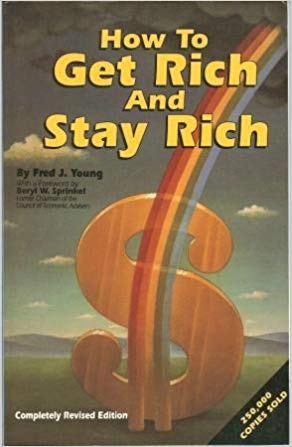How to get out of debt (without gimmicks or games)

As part of back to basics month, let's use today to explore how you can get out of debt without gimmicks or games.
After twelve years of reading and writing about money, I've come to believe that debt reduction ought to be a side effect and not a goal. Getting out of debt is a target, not a habit. And, as we've been discussing recently, good goals are built around actions instead of numbers. If you restructure your life so that you're spending less than you earn, you will get out of debt. It's a natural side effect.
Having said that, I realize that a lot of GRS readers are struggling to get to square one. Getting out of debt is their goal and primary obsession. That's okay.
The best (and worst) states for saving money and getting ahead 2018
Looking to save versus spend? Eager to sock money away not just for a rainy day but potentially for stormy months, even years, ahead?
Consider heading to the Heartland.
The Midwest is home to some of the very best places to save money and get ahead in the U.S., according to a new analysis by Get Rich Slowly.
The ultimate round-up collection of personal finance books

Reading books on investing money is a great way to learn more about what you should do at each point in your financial journey. In some respects, it doesn't really matter where you are in your journey because, no matter what you need help with, there's a book that covers it.
Deciding which book to read when, though, can be a bit of a challenge. So we created this huge collection of personal finance books to help with that. Here's how it works:
How to get rich and stay rich


You see, everything about this book exudes scamminess. The title is scammy. The cover looks scammy. The amateurish formatting seems scammy. But the book is not scammy. How to Get Rich and Stay Rich is a marvelous prototypical book about early retirement. I enjoyed it.
Fred J. Young, the author, was born and raised in rural Tennessee during the 1910s. His family was poor, as were all of their neighbors. Young decided he wanted to do something more than be a farmer, so he left Tennessee to become a lawyer. After military service, he worked for Harris Bank in Chicago, where he spent three decades advising wealthy clients.
Building a wealth snowball

To conclude "back to basics" month at Get Rich Slowly, today we're going to explore an important concept, one that's new to most people. Today, I want to talk about building a wealth snowball.
After nearly twelve years of writing about money, I've gone from not knowing anything to having some very strong opinions.
I now believe know, for instance, that the single most important thing you can do to improve your financial situation is also the most elementary: Increase the gap between your earning and spending.
The Get Rich Slowly Anniversary
The middle of April is a Big Deal in my world.
The trees have nearly finished blossoming, which means my allergies will soon go away. We're seeing more of the sun, which means the worst of my seasonal depression is behind me. Today, on the 15th, Get Rich Slowly celebrates its anniversary.
In the Beginning
When I started Get Rich Slowly, I had no idea what it was going to become. I had no grand plan or vision. I just wanted to write about money while accomplishing three goals.
Why investing can be better than repaying debt
It's a difficult choice: On the one hand, you understand the need to begin investing early to make the miracle of compounding work for you; on the other hand, you know that, when you have debt, making those payments hampers the ability to harness the miracle of compounding.
So, what should you do with that $500 you have -- invest it or pay down the debt? The answer is not as simple as some make it out to be.
Reasons to repay debt first
1. Risk of disaster
As I mentioned in the article about starting to save for retirement, life is not always fair or kind. Most of us depend on a paycheck for everything: rent or mortgage, food, gas, utilities and so forth. When something happens, like losing your job, divorce or severe illness, those checks get smaller, or may even disappear temporarily. We can cut back some of our expenses like gas, clothing, etc. But some things are impossible to cut back. That list is usually headed by rent or mortgage payments and those monthly payments all other forms of debt require. You can't cut those back in times of trial.
Mastering your money: 12 steps to financial freedom

We discuss many aspects of personal finance at Get Rich Slowly. We explore ways to earn more money, get out of debt, and build an emergency fund. We talk about the psychology of money management, and we share tips and tricks for making the most of your savings and your career. Basically, we do our best to help readers take control of their financial lives.
Sometimes it's easy to get lost in the little details of money management. Sometimes we forget the Big Picture. If you've resolved to take control of your finances, this article is the place to start. It's packed with tips and resources for making the most of your money.
How to get started with real estate investing

Today's article is from Chad Carson, who writes about real estate investing (and other money matters) at Coach Carson. I've always been intrigued by real estate investing but overwhelmed by how much info available. I asked Chad if he'd be willing to write an article that would help me (and other GRS readers) understand the basics of real estate investing. This is the result.
I got started in real estate investing right after college. Because a young adult can basically sleep in a car if he has to (my 1998 Toyota Camry with cloth seats was comfortable), I had little to lose by launching a business. Unfortunately, as a Biology major, I also knew very little about business or real estate. But I did know how to hustle and to learn. That helped.
Slowly, I learned to find good deals and to resell them for a small markup of profit (a.k.a. wholesaling). I also learned to buy, fix, and flip houses for a bigger profit (a.k.a. retailing). After a few years, my business partner and I began keeping some rental properties because we knew that was the path to generating regular, passive income.
Pay off student loans or invest — how to move toward funding retirement
In my recent post, "Why investing can be better than paying down debt," Dianecy's comment raised a question faced by many: What do you do about investing when you have student loans?
It is quite the dilemma, actually, because the best time to start funding your retirement is when you're still in your 20s. And as anyone who has been reading Get Rich Slowly for more than, say, 10 seconds would know, few things impede your progress toward getting rich (at any speed) like debt.
The reason is simple: A dollar can be spent only once -- either for another person's benefit or for yours. So it follows that repaying debt benefits the bank; investing those same dollars in a CD or index fund, on the other hand, benefits you and your future.
